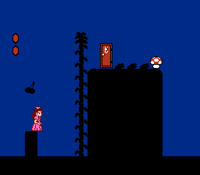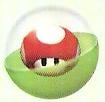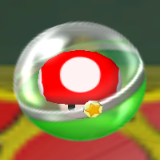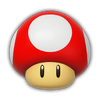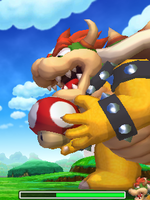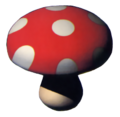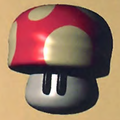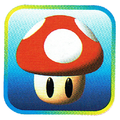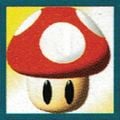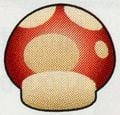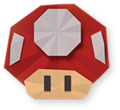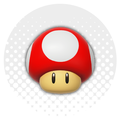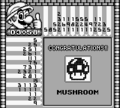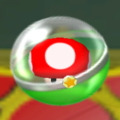Mushroom
- Not to be confused with Super Mushroom or Dash Mushroom.
- This article is about the item that heals Mario's Heart Points in RPGs, among miscellaneous uses. For other uses, see Mushroom (disambiguation).
- "Shroom" redirects here. For the enemy in Donkey Kong 64, see Shroom (enemy).
| Mushroom | |||
|---|---|---|---|
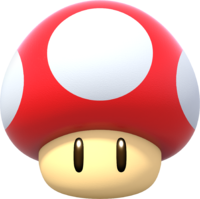 Artwork from Super Mario Party Jamboree | |||
| First appearance | Super Mario Bros.: The Lost Levels (1986) | ||
| Latest appearance | Mario & Luigi: Brothership (2024) | ||
| Effect | Adds an additional mark (Super Mario Bros. 2) Initiates Fever Time (Mario Clash) Restores HP (RPGs) Allows a player to roll two Dice Blocks (Mario Party series, Mario Party 2 – Mario Party 7) Adds five to the player's roll (Mario Party series, as of Mario Party Superstars) Makes a player run faster (Mario Tennis series) Throws a ball farther (Mario Golf: World Tour) | ||
| |||
- “This is a mushroom! Grab these to recover HP.”
- —In-game text, Super Paper Mario
Mushrooms are recurring items in the Super Mario franchise. Their effect on the player character varies from game to game. They often share a design with Super Mushrooms from the Super Mario series and Dash Mushrooms from the Mario Kart series.
History[edit]
Super Mario series[edit]
Super Mario Bros.: The Lost Levels[edit]
In Super Mario Bros.: The Lost Levels for Disk System, ordinary mushrooms appear as decorative objects, replacing picket fences from the original Super Mario Bros. These were replaced in All Night Nippon: Super Mario Bros. with thematically-appropriate microphones. Due to the bundled Super Mario Bros. and The Lost Levels sharing graphical assets in Super Mario All-Stars and Super Mario Bros. Deluxe, background mushrooms are replaced with fences with those versions.
Super Mario Bros. 2 / Super Mario Advance[edit]
In Super Mario Bros. 2, Mushrooms,[1] also known as Sub-space Mushrooms[2] (or Subspace Mushrooms),[3] add an additional mark or heart to the Life Gauge, up to four. Additionally, the Mushrooms also turn Mario, Luigi, Peach, and Toad back into their Super forms if they are in their Small forms in the same manner as a Super Mushroom or a small heart, and the Life Gauge is refilled upon collection. Mushrooms are found only in specific Subspace locations within the stage.
In Super Mario Advance, an extra mushroom is added to each level, bringing the maximum total to five hearts. During the Yoshi Challenge, two mushrooms in each level are replaced by Yoshi Eggs.
The equivalent to the mushrooms in Yume Kōjō: Doki Doki Panic is hearts.
Mario Clash[edit]
In Mario Clash, defeating 30 target enemies causes a Mushroom to spawn from the pipes. This item initiates Fever Time, allowing Mario to defeat any enemy with a single throw and doubling all points. The effect ends if Mario loses a life or the shell and when he finishes the stage.
Super Mario RPG: Legend of the Seven Stars[edit]
In Super Mario RPG: Legend of the Seven Stars, a basic Mushroom can be accumulated in the inventory and recovers 30 HP for one party member. This Mushroom has a red and white cap with an orange stem and no face. However, mushrooms that have faces are found in treasure boxes, and they automatically recover all HP and FP for Mario's entire party once uncovered. Most of these treasure boxes restock once the area is entered again. Other types of mushrooms exist, including two other increasingly expensive kinds used for basic recovery. The Mid Mushroom recovers 80 HP to one party member, and they have a green cap rather than a red one. The Max Mushroom is able to recover all HP to one party member and has a yellow cap. In the Japanese version, the Mid Mushroom and Max Mushroom are respectively known as Super Mushroom and Ultra Mushroom, which would become the terminology used in future RPGs.
There are mushrooms indistinguishable in appearance but instead cause negative effects on allies and adversaries alike. The Bad Mushroom, only found in Seaside Town, does not recover HP and is used only in battle. When used, they poison an enemy of choice, but some enemies are resistant. Another mushroom is sold by the Mini Goomba Triplets at the shop in Monstro Town. These mushrooms, apart from restoring 30 HP, actually turn the user into a Mushroom (a status ailment also caused by certain enemy actions). While a mushroom, the character recovers health every turn, but is completely immobilized.
Mario Party series[edit]
- For a list of probabilities of Double Dice Block rolls with Mushrooms, see Double Dice § Probabilities.
Mushrooms appear as usable items in many games in the Mario Party series, usually increasing the number of spaces the player can move. Similar items have appeared in games in which the regular Mushroom is not present, such as the Mega Mushroom in Mario Party 4, the Twice Candy in Mario Party 8, and the Double Dice Set in Mario Party DS.
Many variants of the Mushroom have appeared in the Mario Party series alongside the normal variety, such as the golden Super Mushroom, which provides a stronger version of the regular Mushroom’s effect, the Cursed Mushroom, which reduces a player's maximum roll on the Dice Block, and the Reverse Mushroom, which causes a player to move backward on their turn.
Mario Party[edit]
In Mario Party, a regular Mushroom is one of two Mushrooms that can appear when a player lands on a Mushroom Space. If the player gets a Mushroom, they can roll the Dice Block again.
Mario Party 2[edit]
The Mushroom appears as a usable item in Mario Party 2. It can be bought from an Item Shop for 10 coins. When used, the Mushroom allows a player to roll two Dice Blocks instead of just one, traveling a number of spaces equal to the sum of the numbers rolled. If the player rolls the same number on both Dice Blocks, they are granted 10 coins, or 20 coins for double 7s. The Mushroom is Mario's favorite item in this game.
Mushrooms also appear with a different design in the minigame Rakin' 'em In, in which the player must push them into their basket to score points, while avoiding Poison Purple Mushrooms.
Mario Party 3[edit]
The Mushroom reappears as a usable item in Mario Party 3, retaining its appearance and effects from Mario Party 2. It can be bought from Toad's Trading Post for 5 coins. It also has the ability to negate curses granted by Bowser, Poison Mushrooms, and Reverse Mushrooms.
Mario Party 5[edit]
The Mushroom reappears in the form of a capsule as the Mushroom Capsule in Mario Party 5. It can be obtained from a capsule machine like other capsules, and can be thrown onto a space for free or used on the player for 5 coins. When used or activated, it grants the player a Mushroom, retaining its effects from Mario Party 2, though rolling double 7s now grants 30 coins.
The Mushroom also appears as an Item Card in the Card Party mode. When used, it allows the player to roll two dice instead of one. There are no rewards for rolling doubles in this mode. A player under the effects of the Dice Bonus Last Card Event rolls a total of three dice when they use a Mushroom.
Finally, the Mushroom appears as a randomly-spawning item in Super Duel Mode. When collected, it improves the speed and control of the player's machine for a short time, the reverse effect of the Cursed Mushroom.
Mario Party 6[edit]
The Mushroom Capsule returns in Mario Party 6, now known as the Mushroom Orb. It can once again be used by players to gain the same benefits as in Mario Party 5, though it can no longer be thrown onto spaces due to the revised Orb system. It can be obtained from Orb Spaces or bought at an Orb hut, usually for 5 coins.
Mario Party Advance[edit]
In Mario Party Advance, Mushrooms allow the player to roll the Dice Block. Each turn, a Mushroom will be depleted from the stock. For players to win Mushrooms, they have to win minigames. Players will usually receive three Mushrooms when they win a minigame, although there are cases in which the award for winning a minigame will be six Mushrooms. The game ends when the player has no Mushrooms left.
Mario Party 7[edit]
The Mushroom Orb returns in Mario Party 7 with the same appearance and effects as in Mario Party 6. When used in a Team Battle, both team members roll two Dice Blocks numbered 1-5, and if the same number is rolled on all four dice, the team is granted 50 coins.
The Triple 'Shroom Orb also appears in this game as the signature Orb of Toad and Toadette. It grants them the effect of the Mushroom Orb for three turns.
Mario Party 9[edit]
In Mario Party 9, Mushrooms appear in the Fungi Frenzy minigame, where 1-3 of them are contained in each panel.
Mario Party 10[edit]
In Mario Party 10, Mushrooms appear in the minigame Movin' Mushrooms. If it falls into a cart, the respective team gains one point.
Mario Party Superstars[edit]
Mushrooms reappear as usable items in Mario Party Superstars. While their original effect is supplanted by the Double Dice, they now add 5 spaces to the player's Dice Block roll, similarly to the Dash Mushroom and Golden Dash Mushroom's effects in Mario Party: Island Tour, Mario Party: Star Rush, Mario Party: The Top 100, and Super Mario Party. They can be bought from Item Shops for 3 coins.
Super Mario Party Jamboree[edit]
Mushrooms reappear in Super Mario Party Jamboree and its Nintendo Switch 2 version with the same appearance and effects as in Mario Party Superstars. The Mushroom Tickets are also introduced in this game, which act as a Mushroom that can be used 2-4 times before they disappear from the player's inventory.
If Pro Rules are being played, a player can have a Mushroom as one of their starting items. In addition, during Party Rules, there is always an option during the Homestretch for one player to receive a Mushroom (which is either the player who selects the event or a random player if the Yellow Toad selects the option).
Mario Tennis series[edit]
Mushrooms appear in the games Mario Tennis for the Nintendo 64, and Mario Power Tennis for the Nintendo GameCube and Wii. These staples can be used during an Item Battle match, which can be obtained when the player hits an Item Box with the ball over the net. In both games, Mushrooms make players run faster, but in the latter game, they can also grow players who have been shrunk by lightning back to normal size. In Mario Tennis Open for the Nintendo 3DS, tennis gear for Miis is designed based on a Mushroom. It is the emblem of the Mushroom Cup for all the previously mentioned games.
Paper Mario series[edit]
| Mushroom | |
|---|---|
| Paper Mario description | A regular Mushroom. Restores 5 HP. |
| The Thousand-Year Door description | A feel-good mushroom. Replenishes 5 HP. |
Paper Mario[edit]
In Paper Mario, Mushrooms act as healing items, as in other Super Mario RPGs. In this game, they heal 5 HP when used. Several variations of Mushrooms can be found, such as Volt Shrooms and Life Shrooms. Recipes can also be made for other types of Mushrooms by combining certain ingredients together by Tayce T.
Paper Mario: The Thousand-Year Door[edit]
Mushrooms return in Paper Mario: The Thousand-Year Door. They heal in the same manner as in the previous game, with the addition that - now that Mario's partners have HP - mushrooms can restore a partner's HP also.
The many variations of Mushrooms from the previous game return, with the addition of Slow Mushrooms. Small creatures named Punies commonly eat Mushrooms, shown by brother and sister Punio and Petuni. At the end of the game, Punio and Petuni give both Mario & Peach a Mushroom to enjoy on their boat ride home. In addition, the Excess Express is said to serve mushroom dishes.
Super Paper Mario[edit]
Unlike in the preceding games, Mushrooms cannot be bought in shops in Super Paper Mario. Instead, they are found out of ? Blocks and heal ten HP upon contact. They also give the player 1000 points. Their carry-on equivalent is the Shroom Shake.
Paper Mario: Sticker Star[edit]
In the fourth game of the Paper Mario series, Paper Mario: Sticker Star, Mushrooms appear, much like every other item, as stickers. They restore 20 HP, but if the button is pressed with good timing, the effect can be increased to 30. Two stronger Mushroom stickers also exist: the Shiny Mushroom, which acts like a Super Shroom, which restores 40 or 60 HP, and the Flashy Mushroom, which acts like an Ultra Shroom, which restores 80 or 99 HP. Big 1UP and Big Shiny 1UP stickers also appear, restoring 10 or 15 HP for 10 turns, respectively, as do Poison Mushrooms, which poison Mario, but enemies also get poisoned if they touch him. It can be found in several levels and bought in Decalburg and Whammino Mountain. It is set in the Sticker Museum as #79.
Paper Mario: Color Splash[edit]
In Paper Mario: Color Splash, Mushrooms appear as cards. They use up red paint when colored in, restore a small amount of HP when used, and cost 20 coins at Prisma Cardware. In addition to regular Mushrooms, Big Mushroom and Mega Mushroom cards also appear, which cost 70 and 150 coins respectively and restore more HP.
Paper Mario: The Origami King[edit]
- “Who likes Mushrooms? ME!”
- —Toad, Paper Mario: The Origami King
Mushrooms reprise their roles in Paper Mario: The Origami King, with their Shiny and Flashy variants returning from Sticker Star. This time, however, they don't appear as stickers, but in a physical, papercraft form. The regular mushroom is the most common and heals 50 HP, while the Shiny and Flashy versions heal 100 and 200 HP, respectively. When used in battle, they will occupy one of Mario's attack slots. All three variants can be found in ? Blocks throughout the game, and after one is found in the world, it then becomes available at Toad Town's item shop. They can also be bought at Overlook Tower and Big Sho' Theater. Mario can hold up to 99 Mushrooms, and unlike in the previous two games, they can be used outside of battle in almost any area. However, they are banned from Scuffle Island, cannot be used while riding down Eddy River, and will be burned by a Fire Vellumental statue when fighting the Paper Macho Shy Guys in the Fire Vellumental Cave. The Mushroom 3-Pack and Mushroom 6-Pack (which have Shiny variants of their own) are bulk items that can be bought in stores for a cheaper price than buying Mushrooms individually.
Recipes[edit]
Paper Mario[edit]
| Recipe | Result |
|---|---|
Paper Mario: The Thousand-Year Door[edit]
| Recipe | Result |
|---|---|
Mario & Luigi series[edit]
Mario & Luigi: Superstar Saga / Mario & Luigi: Superstar Saga + Bowser's Minions[edit]
Mushrooms are the basic item for healing in Mario & Luigi: Superstar Saga. They are the cheapest item found in stores and the first item obtained. Their coloring is reversed in this game, with their caps being white with red spots; they also lack faces. Regular Mushrooms restore 25 HP, Super Mushrooms restore 50 HP, Ultra Mushrooms restore 120 HP, and Max Mushrooms restore all HP. Five special Golden Mushrooms can also be found in the game; the rare item restores all HP and BP. Shroom Badges and Shroom clothings that can be purchased at certain shops will increase Mario and Luigi's stats according to the number of Mushrooms in their inventory.
A unique mushroom called the Invincishroom (claimed to be a mix of 1-Up Mushrooms and Stars, but in the remake, it was actually a Poison Mushroom, as confirmed in the Minion Quest side mode) can be found only when the player has beaten the high score of a certain minigame. The player cannot use it, however, because Mario eats it as soon as he and Luigi win it, causing him to become sick with Bean Fever and slowly turn into a bean. Luigi cures Mario by giving him Crabbie Grass, which is found in Guffawha Ruins.
In Mario & Luigi: Superstar Saga + Bowser's Minions, regular Mushrooms heal 30 HP instead of 25 HP, Ultra Mushrooms heal 80 HP instead of 120 HP, and their designs are changed to be the standard design, as in the other Mario & Luigi games.
Mario & Luigi: Partners in Time[edit]
In Mario & Luigi: Partners in Time, Mushrooms act in the same manner as in Mario & Luigi: Superstar Saga; they restore HP for one member. While the Max Mushroom is still the same, the regular, Super, and Ultra Mushrooms heal 20 HP, 40 HP, and 80 HP, respectively. There are also items called Mushroom Drops, which will heal every single member on the team, very much like the Nuts in Mario and Luigi: Superstar Saga. Unlike Max Mushroom and Max Nuts, however, there is nothing more powerful than Ultra Drops. Shroom Badges make a return, but with a different effect: they now increase the healing effects of a Mushroom.
Shroobs, the main enemies in this game, bear a resemblance to Mushrooms. They have the same mushroom shape and spots, and they even live on a planet shaped like a mushroom.
Mario & Luigi: Bowser's Inside Story / Mario & Luigi: Bowser's Inside Story + Bowser Jr.'s Journey[edit]
Mushrooms return in Mario & Luigi: Bowser's Inside Story and its remake, but Mushroom Drops are replaced in favor of the Nut from Mario & Luigi: Superstar Saga. Mushrooms act in the same manner as in the two preceding games. Mushrooms in this game heal 30 HP, Super Mushrooms heal 60 HP, Ultra Mushrooms 120 HP, and Max Mushrooms heal 240 HP instead of all HP like in the previous installments.
Despite normally using Drumsticks, Bowser is able to use Mushrooms during battles by acquiring them from specific enemies, those being Jailgoons, Broque Monsieur, Trashures, Dark Trashures, or Naplocks. During giant battles, Bowser is able to collect and use giant Mushrooms (originally called Refreshrooms), which recover half of his Health Meter.
A clothing item called Mushroom Glove, causes the wearer to occasinally use a random mushroom during their turn.
Mario & Luigi: Dream Team[edit]
Mushrooms return in Mario & Luigi: Dream Team. Regular Mushrooms heal 30 HP, Super Mushrooms heal 60 HP, Ultra Mushrooms heal 100 HP, and Max Mushrooms heal 160 HP. If Shroom EXP is used, then the value of the HP healed from using Mushrooms during battle will be converted to EXP at the end, but with a 50% bonus. Regular Mushrooms add 45 EXP, Super Mushrooms add 90, Ultra Mushrooms add 150, and Max Mushrooms add 240.
During giant battles, Mario and Giant Luigi can use the Bros. Attack Rhythm Mushroom. In it, Mario throws a number of Mushrooms into the air for Giant Luigi to eat and recover HP.
Some enemies or their associated battles involve Mushrooms. Lakitu and Lakitu R may throw a Mushroom at Mario instead of a Spiny Egg. Popple has an attack where he kicks a number of items at Mario and Luigi, which may include a Mushroom. When the Zeekeeper and Zeekeeper X use their egg dropping attack late in the battle, a Mushroom may appear among the eggs. If Mario or Luigi/Giant Luigi let these attacks hit them instead of countering the Mushroom, the Mushroom will heal them. Corporal Paraplonk uses Mushrooms to heal the other members of the Elite Trio, as does Corporal Paraplonk X for the Elite Trio X. In Bowser's battle in Dreamy Neo Bowser Castle, the second to last phase has Mushrooms appear that either Bowser or Giant Luigi can pick up for healing. Bowser X's equivalent battle has the same event.
All Mushrooms in giant battles are substantially larger than Mushrooms outside of giant battles.
Mario & Luigi: Paper Jam[edit]
Mushrooms return in Mario & Luigi: Paper Jam. Just like in the previous game, the four types are regular (+30 HP), Super (+60 HP), Ultra (+100 HP), and Max (+160 HP).
Super Princess Peach[edit]
In Super Princess Peach, red, purple, and cyan mushrooms with wings appear in Ladida Plains 1-5. They hop twice in place in a set order, each one hopping higher than the last, which corresponds to the order in which Peach must hit the flower baskets of the same colors in the next area.
Mario Golf: World Tour[edit]
Mushrooms are usable item shots in Mario Golf: World Tour. They make the ball roll much farther when they hit the ground. They are also seen as tee markers on the Toad Highlands golf course. Trophies for Castle Club tournaments, and the lampposts of the building's exterior, have models of Mushrooms. The Mushrooms are red on regional tournament trophies and their spots are the trophy's color, while on world tournament trophies, the Mushrooms have crowns on them and are completely colored like the rest of the trophy.
Mario + Rabbids Kingdom Battle[edit]
Mushrooms appear in Mario + Rabbids Kingdom Battle as healing items between battles during levels. Once collected, they heal all active party members 70 HP. The amount of HP healed to Mario can be upgraded via the skill tree, although it remains unchanged for other party members.
WarioWare: Get It Together![edit]
In WarioWare: Get It Together!, a Mushroom appears as one of the obstacles spat out by Wario in the microgame Inside the Storm. It is depicted as a yellow Mushroom with Wario's mustache and no eyes.
Profiles[edit]
Super Mario Bros. 2[edit]
- Wii Virtual Console manual description:
- English:
This item replenishes your life meter and extends it by one mark (up to a maximum of four marks).
- English:
Super Mario Advance[edit]
- Instruction booklet description:
- English (United Kingdom):
These may appear when you enter a warp to Subspace. Pick them up to add extra hearts to your Life Meter.
- English (United Kingdom):
Mario & Luigi: Dream Team[edit]
- Electronic manual description:
- English:
Recovers the HP of one character.
- English:
Paper Mario series[edit]
Paper Mario: Sticker Star[edit]
- Item description:
- English:
Makes you feel better. Just the thing when you're tired. - Other languages:
- Japanese:
げんきに なる。つかれた ときには やっぱ コレ。 - French (Canadian):
Te fait te sentir mieux. Juste ce qu'il faut quand tu es fatigué. - French (European):
Vous aide à vous sentir un peu mieux. Parfait en cas de petite fatigue. - German:
Füllt deine KP ein wenig auf. Das beste Mittel, wenn du dich etwas geschwächt fühlst. - Italian:
Ti fa stare un po' meglio. È l'ideale per riprendersi dalla stanchezza. - Korean:
기운이 난다. 지쳤을 때는 역시 이것. - Spanish (Latin American):
Hace que te sientas mejor. Es ideal cuando estás cansado. - Spanish (European):
Te hace sentir mejor. Si notas cansancio, es justo lo que necesitas.
- Japanese:
- English:
Paper Mario: The Origami King[edit]
- Description: A useful item that can restore Mario's health anytime.
- Collectible Treasure #2: Another valuable resource for restoring Mario's HP. A Mushroom a day keeps game overs at bay!
Gallery[edit]
- See also: Gallery:Super Mushroom
Artwork[edit]
Super Mario All-Stars (Super Mario Bros. 2)
Sprites and models[edit]
Super Paper Mario (Disc Channel)
Super Paper Mario (Flipside Arcade)
Screenshots[edit]
Names in other languages[edit]
| Language | Name | Meaning | Notes |
|---|---|---|---|
| Japanese | キノコ / きのこ[4][5] Kinoko |
Mushroom | |
Kaifuku Kinoko |
Recover Mushroom | Super Mario RPG, treasure box | |
| Catalan | Xampinyó[?] | Button mushroom | The Super Mario Bros. Movie |
| Chinese (Simplified) | 蘑菇[?] Mógu (Mandarin) Móhgū (Cantonese) |
Mushroom | |
| 加血蘑菇[7] Jiāxiě Mógu (Mandarin) Gāhyut Móhgū (Cantonese) |
Add Heart Point Mushroom | Super Mario Advance | |
| Chinese (Traditional) | 蘑菇[?] Mógu (Mandarin) Móhgū (Cantonese) |
Mushroom | |
| Dutch | Paddenstoel[?] | Mushroom | |
| French | Champignon[?] | Mushroom | |
| German | Pilz[?] | Mushroom | |
| Greek | Μανιτάρι[8] Manitári |
Mushroom | |
| Italian | Fungo[?] | Mushroom | |
| Korean | 버섯[?] Beoseot |
Mushroom | |
| Portuguese | Cogumelo[?] | Mushroom | |
| Russian | Гриб[?] Grib |
Mushroom | |
| Spanish (Latin American) | Champiñón, or simply Champi[?] | Mushroom | |
| Spanish (European) | Champiñón, or simply Champi[?] | Mushroom | |
| Seta[9][10] | Paper Mario, Paper Mario: The Thousand-Year Door | ||
| Thai | เห็ด[11] Hèt |
Mushroom |
Mushroom Orb[edit]
| Language | Name | Meaning | Notes |
|---|---|---|---|
| Japanese | キノコカプセル[?] Kinoko kapuseru |
Mushroom Capsule | |
| German | Pilz-Kapsel[?] | Mushroom Capsule | |
| Spanish | Cápsula Champiñón[?] | Mushroom Capsule |
Refreshroom[edit]
| Language | Name | Meaning | Notes |
|---|---|---|---|
| Japanese | かいふくキノコ[?] Kaifuku Kinoko |
Recovery Mushroom | |
| French | Champignon curatif[?] | Healing mushroom | |
| German | Frisch-Pilz[?] | Fresh Mushroom | |
| Italian | Grande Fungo[?] | Large Mushroom | |
| Spanish | Champiñón restaurador[?] | Restorative mushroom |
References[edit]
- ^ 1988. Super Mario Bros. 2 instruction booklet. Nintendo of America (English). Page 19.
- ^ 1993. Super Mario All-Stars Player's Guide. Nintendo of America (English). Page 88.
- ^ Spring 2001. Nintendo Power Advance Volume 1. Nintendo of America (English). Page 14.
- ^ Super Mario Collection instruction booklet, Super Mario USA section. Foldout.
- ^ 1995. マリオクラッシュ (Mario Kurasshu) instruction booklet (JPG). Nintendo (Japanese). Page 17. Retrieved from Planet Virtual Boy.
- ^ 1996. スーパーマリオRPG - FINAL EDITION 任天堂公式ガイドブック. Shogakukan (Japanese). ISBN 4091025382. Page 34.
- ^ iQue (February 27, 2017). 小神游GBA官方游戏宣传视频. Bilibili (Simplified Chinese). Retrieved June 27, 2024.
- ^ 1993. Super Mario All-Stars instruction booklet. Nintendo of Europe (Greek). Page 1.
- ^ FatalRagnarok (May 25, 2015). Paper Mario | Walkthrough Español |Part 2 "El malvado Rey Goomba y esbirros" (14:39). YouTube (European Spanish). Retrieved June 27, 2024.
- ^ DSimphony (July 20, 2022). ¡La nueva Goombadex! - 01 - Paper Mario: La Puerta Milenaria (GC) DSimphony (19:57). YouTube (European Spanish). Retrieved June 27, 2024.
- ^ In-game name displayed in Super Mario Party Jamboree.
- Mushroom items and variants
- Ingredients
- Orbs
- Heads-Up
- Mario & Luigi: Bowser's Inside Story consumable items
- Mario & Luigi: Brothership consumable items
- Mario & Luigi: Dream Team consumable items
- Mario & Luigi: Paper Jam consumable items
- Mario & Luigi: Partners in Time consumable items
- Mario & Luigi: Superstar Saga consumable items
- Mario Golf: World Tour items
- Mario Hoops 3-on-3 items
- Mario Party 2 consumable items
- Mario Party 3 consumable items
- Mario Party 5 capsules
- Mario Party 6 Orbs
- Mario Party 7 Orbs
- Mario Party Advance items
- Mario Party Superstars consumable items
- Mario Strikers Charged items
- Mario's Time Machine items
- Paper Mario consumable items
- Paper Mario: Color Splash cards
- Paper Mario: Sticker Star stickers
- Paper Mario: The Origami King items
- Paper Mario: The Thousand-Year Door consumable items
- Super Mario Advance items
- Super Mario Bros. 2 items
- Super Mario Party Jamboree consumable items
- Super Mario RPG: Legend of the Seven Stars consumable items
- Super Mario Strikers items
- Super Paper Mario consumable items
- Super Princess Peach objects
